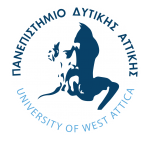Course info:
Semester: 1
General Foundation
ECTS: 6
Hours per week: 4
Professor: T.B.D.
Teaching style: Classroom lectures and tutorials
Grading: 100% final exam
| Activity | Workload |
|---|---|
| Lectures | 26 |
| Tutorials | 26 |
| Exercises and projects | 40 |
| Student’s study | 58 |
| Course total | 150 |
Learning Results
Purpose of the course: The development of basic concepts of Linear Algebra that apply to many scientific disciplines and in particular to informatics and computer engineering.
Aim of the course: At the completion of the course the students should be capable of understanding the basic concepts of Linear Algebra and to have gained the related techniques that will allow him to deal successfully with application problems. At the end of the course the students should know the fundamentals of matrix theory and they should be able to solve systems of linear equations with linear algebra methodologies. The knowledge offered in the course is fundamental to the demands of other courses. The aim of the course will be achieved through selected exercises and optional projects that will be offered to the students during the semester.
Skills acquired
- Research, analysis and synthesis of information
- Adapting to new conditions
- Decision making
- Autonomous work
- Production of new ideas
- Fundamental definitions: Vector, matrix, matrix operations, basic types of matrices
- Inverse matrix, systems of linear equation
- Determinants
- Linear spaces, base of linear space, linear independence, linear subspace
- Eigenvectors, eigenvalues, eigenspaces.
- Exercises and applications of the above
- Gilbert Strang (2016), Introduction to Linear Algebra, Wellesley-Cambridge Press.
https://math.mit.edu/~gs/linearalgeb - Sheldon, A. (2004), Linear Algebra Done Right (2nd ed.). Springer
https://link.springer.com/content/pdf/10.1007%2F978-3-319-11080-6.pdf - Steven Roman (2008), Advanced Linear Algebra, Springer
https://link.springer.com/content/pdf/10.1007%2F978-0-387-72831-5.pdf
- Learning Results - Skills acquired
-
Learning Results
Purpose of the course: The development of basic concepts of Linear Algebra that apply to many scientific disciplines and in particular to informatics and computer engineering.
Aim of the course: At the completion of the course the students should be capable of understanding the basic concepts of Linear Algebra and to have gained the related techniques that will allow him to deal successfully with application problems. At the end of the course the students should know the fundamentals of matrix theory and they should be able to solve systems of linear equations with linear algebra methodologies. The knowledge offered in the course is fundamental to the demands of other courses. The aim of the course will be achieved through selected exercises and optional projects that will be offered to the students during the semester.
Skills acquired
- Research, analysis and synthesis of information
- Adapting to new conditions
- Decision making
- Autonomous work
- Production of new ideas
- Course content
-
- Fundamental definitions: Vector, matrix, matrix operations, basic types of matrices
- Inverse matrix, systems of linear equation
- Determinants
- Linear spaces, base of linear space, linear independence, linear subspace
- Eigenvectors, eigenvalues, eigenspaces.
- Exercises and applications of the above
- Recommended bibliography
-
- Gilbert Strang (2016), Introduction to Linear Algebra, Wellesley-Cambridge Press.
https://math.mit.edu/~gs/linearalgeb - Sheldon, A. (2004), Linear Algebra Done Right (2nd ed.). Springer
https://link.springer.com/content/pdf/10.1007%2F978-3-319-11080-6.pdf - Steven Roman (2008), Advanced Linear Algebra, Springer
https://link.springer.com/content/pdf/10.1007%2F978-0-387-72831-5.pdf
- Gilbert Strang (2016), Introduction to Linear Algebra, Wellesley-Cambridge Press.
